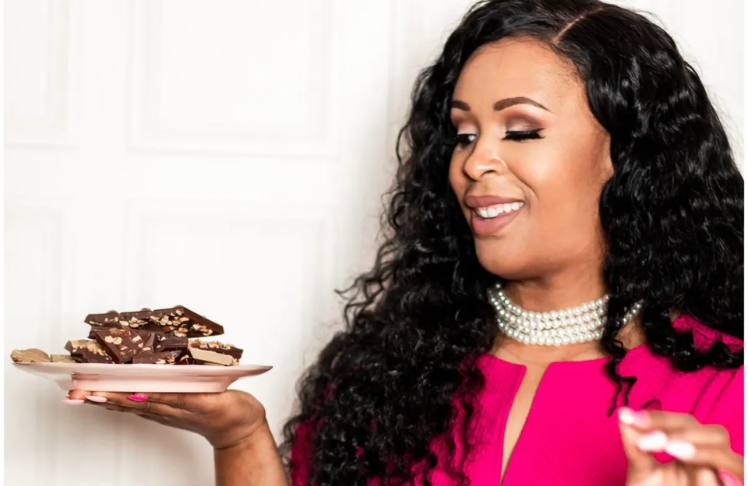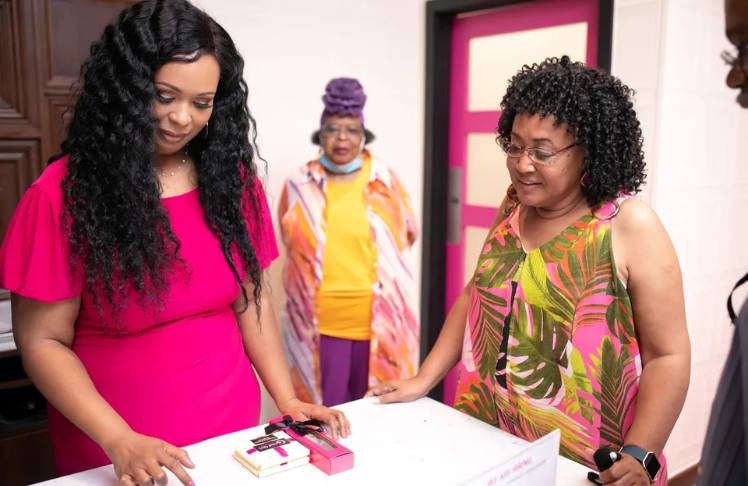
By Bria Overs
Health issues are all too common in the Black community. And Tabatha Carr, the Oklahoma City-based naturopathic doctor behind Good Girl Chocolate, knows this on a personal level.
At 16, Carr’s doctor prescribed her a blood pressure medication. She was a teenager weighing over 200 pounds and wearing a size 22.
Despite her efforts to make positive lifestyle changes, at 30- years- old, she went from one blood pressure medication to three, was diagnosed with pre-diabetes, and struggled with hormonal challenges.
With her family’s history of health issues — including heart attacks, dialysis, and hysterectomies — she had to make a choice: opt for surgery and more medication, or make a significant lifestyle change.
Her health journey led to her shedding 80 pounds and finding a lifelong mission of helping women with health experiences similar to her own. She works with those struggling with anxiety, stress, diabetes, high blood pressure, and weight loss.
And it’s led to her founding a business, too. In 2018, she launched Good Girl Chocolate, a brand with treats that are dairy-free, gluten-free, soy-free, preservative-free, and made with non-GMO organic plant-based sweeteners.
“Basically, it doesn’t have any ingredient in it that would cause inflammation in the body,” she says.
She sees her business as a way to help people experience the pleasures of chocolate without guilt. And it hasn’t been easy, with hurdles to jump over, like the COVID-19 pandemic.
“I wanted to bring something to my community and the world that’s actually clean,” Carr told Word In Black. “When we think about indulging in sweets or desserts, we typically think we can only eat them occasionally. I want folks to know that chocolate can taste good and still be clean.”
The New Farm-to-Table Is Bean-to-Bar
Good Girl Chocolate carries a range of products, like milk chocolates, dark chocolates, and brownie bars with five ingredients or less. Carr roasts and grinds her cocoa beans for an overall three-day process.
“There are very few Black chocolate factories,” she says. “We’re more than just a chocolate company. I’m more than just a chocolatier. We’re a bean-to-bar chocolate factory making chocolate from scratch.”
Good Girl Chocolate opened its factory at the Penn Square Mall in July 2021. The original plan was to open in 2020, but with the pandemic, they had to slow things down.

According to the Federal Reserve, more than 700,000 businesses closed from March to June 2020, accounting for nearly three million job losses. Fortunately, Carr says, she didn’t have to lay off any of her staff or close her business.
While facing the challenges of the pandemic, Carr applied for the BeyGOOD Black-Owned Small Business Impact Fund, a $10,000 grant provided by Beyoncé Knowles-Carter’s public charity foundation.
She remembers applying for it right before the deadline. A few weeks later, she noticed her chocolate on the foundation’s Instagram page.
“That money helped tremendously because we were just ramping up and getting started, and then COVID hit,” she says.
The Future of Good Girl Chocolate

Carr is focused on growing her business and doing it successfully. Her chocolates are now available in the Austin-Bergstrom International Airport in Texas and Tulsa International Airport in Oklahoma.
Good Girl Chocolate was also part of the Grammy Awards gifting in 2019 and 2023.
Her next big launch? Having her products in Whole Foods stores in the southwest region starting in June 2023 and then expanding to stores nationwide.
Good Girl Chocolate was selected to be part of Whole Foods Market’s Local and Emerging Accelerator Program. The program provides partnerships, mentorships, education, and a potential opportunity for financial support of $25,000.
“You just have to be lean. A lot of minority businesses either fail or give up because of the lack of resources and support,” Carr says. “But I know that I not only have something good and fantastic — I have something unique. I have something that stands out in the market, putting me in a very, very good position.”















